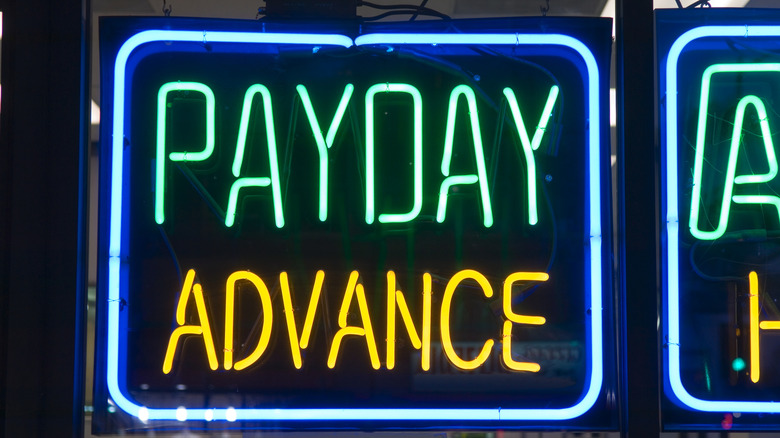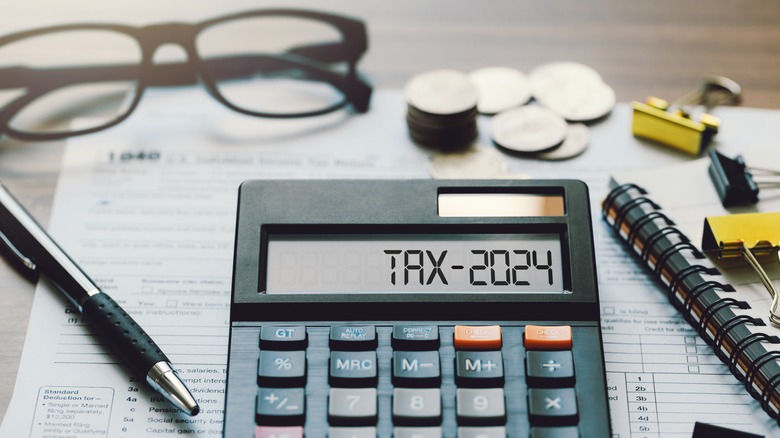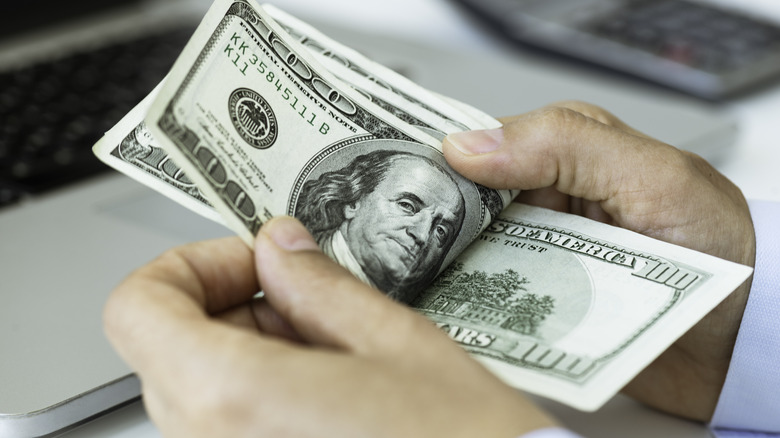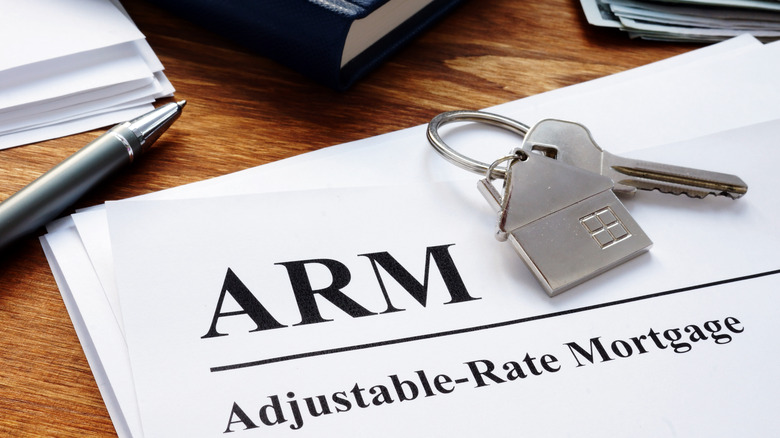11 Types Of Loans That Will Keep You Poor Forever
Lending products have become a routine feature in modern financial literacy and life. Virtually everyone relies on some kind of loan to assist them in short- or long-term pursuits. 87% of all buyers purchasing a new primary residence finance the effort, and 95% of first-timers rely on mortgage loans to complete the transaction, according to reporting by NAR. In all phases of life, there's seemingly a lending product designed to help ease the financial burden of the task. But many of these loan options can do more harm than good. From payday loans that erode financial mobility with astronomical interest rates to non-traditional lending arrangements in the real estate market, borrowers can easily dig themselves into a hole.
These loan varieties are perhaps better left alone by those looking to establish solid financial security. As a result, none of these lending products make sense for the typical borrower under most circumstances and will only serve to create added financial strain over the long term.
Payday loans
Payday loans are without a doubt the worst kind of debt product you can find. A payday loan styles itself as a kind of bridge solution for short-term financial needs. The idea is that if you've got a flat tire but don't get paid until Friday, a small cash loan today can get you back on the road now before repaying it when your paycheck is deposited a few days later. In theory, the payday loan is a simple concept that's easy to understand and seems beneficial for anyone finding themselves in a bind. But the dark reality is much different.
In practice, payday lenders are some of the most predatory around, with interest rates rising into the hundreds or even thousands of percentage points. To make matters worse, rules regarding repayment obfuscate the truth that many payday borrowers end up in a cycle of borrowing and repayment. Ultimately, this leaves borrowers to slowly sink into more and more debt with each passing loan and repayment cycle. John Oliver tackled the payday lending landscape in the first season of his show, "Last Week Tonight," lamenting that companies involved in these practices "are almost impossible to effectively regulate, and they are not going anywhere." Oliver's warning stands the test of time, with more than half of U.S. states still allowing short term and payday lending to take place.
Revolving lines of credit
Credit card debt amounts to $1.129 trillion collectively across the United States. This figure is the highest it's been since tracking began in 1999. Combined with staggering interest rates that start above 20% for even the most credit-savvy borrowers, credit card lending arrangements are some of the costliest financial products you'll find in the marketplace. The interest rate alone should be enough to create speculation over strategies that might see credit cards utilized heavily for spending and long-term financial planning. However, interest rates that stand head and shoulders above many other lending products in terms of cost aren't the only feature revolving line of credit that users should be concerned with.
Because a credit card acts as a fluid borrowing tool, overextending on your utilization is entirely possible, perhaps even the point. Credit cards can add a trickle of cashback or even rewards points to your financial balance but these are only useful if you pay off your spending in full every month. Any time you allow a balance to carry over from one billing period to the next you'll incur the full wrath of your cardholder agreement's interest rate. A simple purchase can balloon into an exponentially more expensive repayment in the blink of an eye, making credit cards a potentially dangerous lending product for inexperienced users.
Tax debt
Your yearly tax burden is a different kind of loan altogether. Because of all the tax breaks and deductions available to the average American, the income tax you pay with each paycheck acts in part as a loan to the federal government. Millions of Americans are refunded every year, with the average refund in 2024 standing at $3,145, so far. However, not every taxpayer will receive a refund, and some will even owe more to the government due to their unique income situation.
If you own tax debt, it's important to remember that you may end up being charged penalties or interest if you don't submit payments by the tax day deadline in April. But this isn't the only chaos that can come into play financially for those who are late paying off their tax debt. The IRS can be an aggressive pursuer, and your wages can be garnished to make up the shortfall. Tax liens can be placed against your home and other assets and you may find your passport restricted. The IRS can also deploy a private collections agency to handle the reclamation of your debt. Collections companies are notoriously obnoxious and often do their best to walk a fine line between pushy and truly harassing. The restrictive abilities of the IRS are the most damaging, however. A tax lien means that if you try to sell an asset like your home or car, a portion of the proceeds will likely go to the lienholder.
Cash advance offers
Cash advances are often found through your credit card provider. Balance transfers and cash advances are often easy to utilize and in some cases you may even get the money deposited into your account on the same day that you submit a request. But a cash advance is something you should use sparingly, and only if the terms make sense. Often, cash advance offers include an interest rate that's even higher than the standard purchase APR on your cardholder agreement. This means that while using a cash advance might be easy, repaying it is even more challenging than a typical tap or swipe of the card.
Sometimes you'll find favorable terms on this kind of lending product. If you are a cardholder in good standing and possess a solid credit score, you may be offered a low-interest rate for a predefined term. Your credit card issuer might even offer a 0% rate for a few months, buying you precious time to repay the new loan portion without tacked-on expenses. Generally speaking, cash advance offers don't include special financing deals and appeal to those already struggling with some other kind of financial hardship. Therefore, they often only serve to add to the card companies' profits at your expense.
Loans aimed at paying for a vacation
Vacation loans are another debt type that can be extremely costly, going above and beyond the typical financing environment. There's nothing wrong with going on vacation and taking in new experiences that you'll keep for life. This is especially important for couples and those with children, but solo travelers can also find immensely enriching life experiences while on the move. However, taking out a personal loan or relying on a lending product designed to cover vacation expenses is a great way to find yourself contending with new and long-lasting debt. The problem with borrowing for an intangible expense like this is the added cost associated with the interest rate. Your hotel might cost $100 per night, but if you don't pay off your credit card bill promptly or finance the expense with a personal loan, this price tag can balloon to double, triple, or worse over the lifetime of your repayments.
Lending products become even less favorable when they involve a timeshare purchase. Timeshares are a kind of real estate product that benefits the sellers and provides little in value to the buyer. Financing a timeshare purchase is a great way to create a lasting cycle that can be nearly impossible to escape from. Not only will you have to service the debt, but timeshares often include monthly maintenance and usage fees, regardless of whether you actually have a chance to spend time at the property.
Title loans using a car as collateral
Title loans are a type of collateralized lending product that can help borrowers make ends meet in an extreme pinch. While it's often very risky to use something you rely on as collateral, this type of lending product can be a valuable option for those who have found themselves in a unique and difficult position in the short term but know that this hardship will pass and normality will return to their finances. You may have been injured in an accident or taking some time off work due to short-term illness and need a stopgap solution to get through a month or two of expenses. Without an emergency fund in place, a title loan might be an option that gets the job done.
The problem with title loans lies in the risk combined with the circumstances a borrower might find themselves in. For someone in more financial danger, collateralizing a vehicle or home can introduce even more vulnerability. If you find yourself unable to make repayments, you can end up losing your home, car, or any other valuable asset you collateralize. Title loans often involve cars; but finding that your primary mode of transportation has suddenly evaporated will leave you struggling. This means difficulty getting to work, doing routine grocery shopping, or engaging in the hobbies and activities you frequent with friends or family. A title loan can exacerbate already dire circumstances in a truly horrifying way.
Loans provided through non-institutional individuals: Loan shark financing
There are certainly some types of loans and lending products that make less sense than others, but the source of borrowed money can also make a difference. Loan sharks are a type of lender that should always be avoided. Individuals doling out capital aren't bound by the same institutional regulations and conduct expectations that banks and other financial institutions adhere to. As a result, individual lenders set their own terms and determine their own eligibility requirements.
There isn't anything inherently wrong with borrowing money from a private individual, especially one you know personally, but the trouble arises when it comes time to repay a debt. You can never truly tell how an individual will react to any sort of update you might give them. A friendly lender can turn aggressive upon hearing that you'll be late with the payment, and if you haven't created an airtight contract your lender might even try to change the terms after the fact. People dealing with loan sharks have even reported threats and actualization of violence as an intimidation tactic during the repayment process. Lenders of this nature are wild cards and introduce far too much risk and uncertainty for any borrower to find acceptable. Altered terms or threats of violence can fundamentally shift your ability to maintain repayments or other financial obligations, leaving you worse off than when you started.
Pawn shop lending
Pawn shops can act as a unique resource for finding one-of-a-kind buys. There are all kinds of things in pawn shops from jewelry to musical instruments, but you may have never thought about the way they get there if you've only entered as a customer. The pawn shop model acts as a marketplace for unique items, but pawn brokers also provide loans to individuals in return for collateralized items. Repaying a pawnbroker will see your belongings returned, but interest rates can be exceedingly high. Moreover, if you don't repay the debt the pawn shop may end up selling your items to recoup the cost of the loan.
As is the case with other collateral-backed landing options, the risk is much higher than a traditional loan. More importantly, there is a contingent of pawn shop users who may only have a small collection of valuable goods introducing a sense of sentimentality into the things being pawned. A piece of jewelry passed down through generations or a wedding ring may be the most viable asset you have for use at the pawn counter. Getting this item back therefore becomes a critical task that can see other financial goals and stabilizing efforts put on the back burner.
Adjustable-Rate Mortgages (ARMs)
Risky lending isn't only contained to personal loans and credit card spending. Even though the most pervasive mortgage underwriting practices that caused the housing crisis of 2008 have subsided, mortgages that place borrowers in risky financial standing still exist. The Adjustable-Rate Mortgage (ARM) is one example of a potentially fraught real estate lending option. An Adjustable-Rate Mortgage combines the locked in price of a fixed rate with future variable adjustments. For the first five or 10 years, your rate will be fixed at a certain figure, and then for the remainder of your loan repayment term the rate will revert to the market's variable price tag.
The idea here is to give borrowers a bit of consistency up front, defending them against the worst of the market's fluctuations in the short term. But with forecasts suggesting continued interest rate turmoil extending into the future, this type of mortgage only delays the inevitable. The result is a mortgage that bundles the negative aspects of both borrowing products with little in the way of overarching benefit. Borrowers who opt for an ARM in the current market may be setting themselves up for the necessity of a refinancing opportunity down the road. Refinancing can be beneficial, but it will add to the total cost of your home purchase, negatively impacting your ongoing financial standing.
Interest-only mortgages
In the same way that adjustable rate mortgages don't offer the glowing benefits that might seem to be standout features of the product, interest-only mortgages are perhaps even worse. With this type of mortgage, you'll pay only the interest for the first few years and then start to hack away at principal payments. This can be lumped into a large payment or organized as a continuation of monthly contributions in the same way that a standard mortgage term might appear.
An interest-only mortgage is valuable in some contexts, to be sure. Because the interest-only term comes with lower monthly payments, it can be a beneficial lending product for a real estate investor seeking the lowest possible costs during the turnaround before a resale. This benefit comes at a cost in the form of higher interest rates than a standard mortgage. Also, homeowners looking to remain in the home will see a significant boost to the monthly cost after this term ends, and buyers won't build equity upfront, making it less valuable as a trading commodity if a decision to move creeps into the picture. The downside is too large for routine homebuyers to consider when shopping around for a lending product to help secure a home purchase.
Student loans, particularly through private lending channels
Student loans fall into a bit of a gray area when it comes to their value and potential downside. Federal loans offer some of the lowest interest rates on the market, with a 5.50% rate attached to all new undergraduate loans originating through federal channels for the 2023-24 school year. This makes them a quality debt product that can help you achieve something financially without a scathing vig attached. Student loans have become even more complicated in recent months with the pause on repayments ending in October 2023 and some federal efforts to forgive student loans being killed by the Supreme Court a few months earlier in June. Even so, repayment plans and forgiveness pathways have made existing borrowers rethink aggressive repayment strategies.
Under the prevailing system of repayments — new policy rumblings aside — student loan debt has become an untenable monster that's a relative nuisance in some instances and tears away at financial mobility in others. Lengthy repayment timelines and hefty monthly bills have placed some graduates in rough territory as they search for a good job in their field and work to progress in other life goals. The trouble with student debt is that it comes in so many formats. Anyone who utilized private loans or refinanced existing debts through a private company likely won't enjoy the same benefits that federal borrowers may see in the future. To top it off, private loans are often more expensive.











